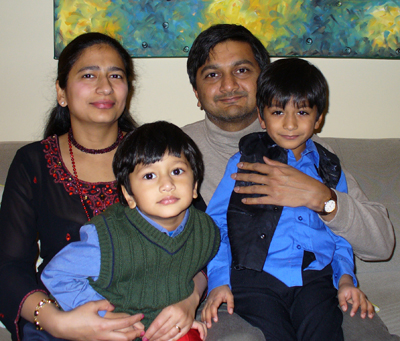Catching Up: Arun Muralidhar '88 |
| Printer-friendly version | Email this article |
|
"Others sacrificed to keep me in school, and that first taste of learning opened my eyes to the potential for much more," he told us. "That’s what I would like to give to these children.
"I’ve never been more energized by a plan," said the Wabash economics major, who by then had earned his Ph.D. from MIT, where he studied under Nobel Prize winner Franco Modigliani.
We called Muralidhar nine years later to see how that plan turned out.
"Then one day I was in Bombay visiting my mom and someone called me and said, ‘There’s a lady who runs an orphanage; she’s in pretty dire straits. Would you have the time to go help her?’
"I said, ‘Sure,’" Muralidhar recalls. And though the City Mission of India orphanage has been a part of his life ever since, it also helped him realize his calling was elsewhere.
The economist began helping the orphanage onsite in 1997, but it wasn’t long before those he worked with suggested he was missing his true vocation.
"One woman there put it rather bluntly." He laughs. "She said, ‘Your best contribution to what we’re doing would be to raise money and send it so we can do our good work.’
"As much as I didn’t want to hear that, she was right. Money is hard to come by in India, and it is even more difficult to get people from the United States to contribute money to causes there.
"So I didn’t find my calling," he laughs, "it was given to me!"
"The orphanage had 50 or 60 kids in a single room, and half of those were sleeping on the floor—a very tough way to live. First we built them bunk beds, then we helped the orphanage raise funds and put them in touch with social workers they needed. We helped them acquire a property just outside of town, where the kids could have their own home. My brother funded construction of a school building so they could have some teachers on site."
Although Muralidhar had gone to India to offer kids an education, he says he learned far more from them.
"One particular moment really blew my mind," he says. "In India, they make a big show when somebody important shows up—they garland him with flowers and have a big celebration. Once when I visited the orphanage, the director organized such an event for me, and I was embarrassed.
"I turned to her and said, ‘This really is not me. I don’t like all this attention and festivity, you know.’ And she turned around and said, ‘How selfish of you! This is not for you. This is for the kids. If they get the feeling that someone important has come to see them, they get a better sense of their own worth.
"Sometimes the way you are called to truly help people surprises you!" With his new vocation in mind, Arun returned to the U.S. in 1998 and interviewed for a job at a New York investment firm. A woman partner in the company pressed him for an assessment of his service work in India.
"She wanted me to admit it was a failure, as if someone doing something so idealistic was either crazy or a loser who was just coming back to his senses. But it wasn’t that way for me; if I hadn’t done that work in India, I would be much worse off today. That work set a balance for me; you do a job, you earn a living, but you also find ways to help other people."
That’s the path Muralidhar follows today: in his work with Mcube; in his book outlining the most sensible approach yet conceived on social security reform; and in his ongoing work with City Mission of India Society and Trust.
"As luck would have it, there was this really bad flood this year that wiped out much of our work, so now we’re trying to raise funds to rebuild it. It seems these thing always hit hardest the people least capable of helping themselves."
And that’s when the call goes out for Muralidhar, his brother, and those who support the orphanage and its mission, to step in.
|

 When we interviewed Arun Muralidhar ’88 in late 1996, he’d just left a job managing a $5 billion pension fund at the World Bank to teach kindergarten in India.
When we interviewed Arun Muralidhar ’88 in late 1996, he’d just left a job managing a $5 billion pension fund at the World Bank to teach kindergarten in India.